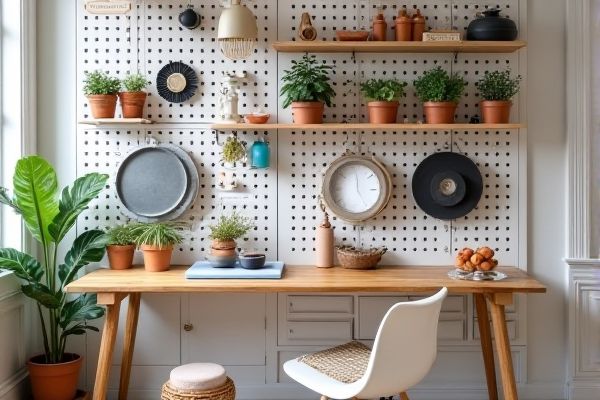
Pegboard organization offers flexible, easily reconfigurable storage ideal for small tools and accessories, while slatwall organization provides a sturdy, visually appealing solution suited for heavier items and professional displays. Explore the differences in durability, customization, and space efficiency to determine which system best suits your organizational needs.
Table of Comparison
| Feature | Pegboard Organization | Slatwall Organization |
|---|---|---|
| Material | MDF, metal, or plastic with evenly spaced holes | Wood, MDF, or PVC panels with horizontal grooves |
| Installation | Requires wall mounting with anchors or screws | Mounted on walls with brackets and designed for modular accessories |
| Versatility | Compatible with hooks, bins, and shelves; limited by hole spacing | Highly versatile; supports shelves, hooks, baskets, and various attachments |
| Load Capacity | Moderate; depends on material and hook strength | High; designed to hold heavier items securely |
| Customization | Fixed hole pattern; less flexible for large items | Flexible groove placement allows varied accessory positioning |
| Use Cases | Home workshops, garages, craft rooms | Retail displays, professional workshops, storage solutions |
| Cost | Generally more affordable and easier to DIY | Higher cost due to materials and accessory variety |
| Aesthetic | Functional, utilitarian look | Sleek, modern appearance; customizable finishes |
Introduction to Pegboard and Slatwall Organization
Pegboard organization features perforated panels that accommodate hooks and accessories, offering versatile storage for tools and small items. Slatwall organization uses horizontal grooves to hold customizable shelves and hooks, ideal for heavier equipment and retail displays. Choosing between pegboard and slatwall depends on your specific needs for accessibility, weight capacity, and workspace aesthetics.
Key Features of Pegboard Systems
Pegboard systems feature perforated hardboard with evenly spaced holes designed for versatile tool storage using hooks, pegs, and bins. These systems allow for customizable layouts and easy rearrangement of tools, optimizing workspace efficiency. Pegboards are typically lightweight, cost-effective, and compatible with various accessories tailored to different organizational needs.
Core Benefits of Slatwall Organization
Slatwall organization offers versatile storage options by allowing easy customization with hooks, shelves, and bins that can be repositioned without tools. Its sturdy panels support heavier items compared to pegboards, making it ideal for garages, retail spaces, and workshops. You benefit from maximizing vertical space and maintaining a clean, organized environment with quick accessibility to your tools or merchandise.
Installation and Setup Comparison
Pegboard installation requires mounting a perforated board directly onto a wall or surface, often involving simple tools like screws and anchors, making it quick and accessible for DIY setups. Slatwall systems involve attaching horizontal panels with interlocking grooves that can support heavier accessories, necessitating more precise alignment and occasional wall reinforcement. Your choice depends on the complexity of setup you prefer and the weight capacity needed for your storage solution.
Space Utilization: Pegboard vs Slatwall
Pegboard organization maximizes vertical space with evenly spaced holes allowing flexible placement of hooks and accessories, ideal for small to medium storage areas. Slatwall panels optimize wall space by accommodating a variety of custom-fit shelves and baskets, supporting heavier items and larger tool collections. Slatwall systems typically offer more robust space efficiency and customization in larger workshops or retail environments.
Versatility and Customization Options
Pegboard organization offers high versatility with easily rearranged hooks and accessories that accommodate various tools and items, making it ideal for quick customization. Slatwall organization provides robust customization through a wide range of compatible shelves, hooks, and bins, supporting heavier loads and complex configurations. Both systems maximize space efficiency, but pegboard excels in rapid adaptability, while slatwall suits long-term, durable installations.
Durability and Maintenance
Pegboard organization offers moderate durability, typically made from tempered hardboard or metal, which resists rust and wear but can dent under heavy impact; maintenance involves simple cleaning and occasional re-lacing of hooks. Slatwall organization excels in durability, constructed from high-density fiberboard or PVC with a laminated finish that resists moisture, scratches, and heavy loads exceptionally well, requiring minimal upkeep beyond dusting. Your choice depends on the balance between ease of maintenance and long-term strength needed for your storage environment.
Cost Comparison: Pegboard and Slatwall
Pegboard organization typically costs less upfront, with basic panels priced between $10 and $30 per square foot, making it a budget-friendly option for small to medium storage needs. Slatwall systems, ranging from $25 to $50 per square foot, involve higher initial investment but offer greater durability and customization options, which can enhance long-term value. Considering installation and accessories, pegboard provides economical flexibility, while slatwall justifies its higher cost through versatile hooks, shelves, and integrated storage solutions.
Best Applications for Each System
Pegboard organization offers versatile storage solutions ideal for workshops, garages, and craft rooms where small tools and accessories need to be easily accessible and customizable. Slatwall organization excels in retail environments and storage areas requiring heavy-duty support and adjustable shelving for larger items and display setups. Both systems optimize space, but pegboards prioritize lightweight tool arrangement, while slatwalls enhance durability and load capacity for varied storage needs.
Choosing the Right Organization Solution
Pegboard organization offers versatile customization with easily adjustable hooks and accessories, ideal for lightweight tools and frequent reconfiguration, while slatwall organization provides a sturdier, more professional appearance with heavier-duty panels suited for larger or heavier items. Consider space availability, load capacity, and desired aesthetics when choosing between the two; pegboards excel in compact workshops, whereas slatwalls benefit commercial or larger storage settings. Prioritize compatibility with existing wall structures and accessory variety to maximize efficiency and long-term usability.
 homyna.com
homyna.com